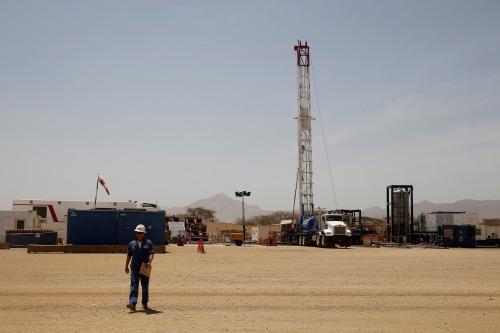On April 15, the Natural Resource Governance Institute published the report, “Resource Governance Index: From Legal Reform to Implementation in Sub-Saharan Africa.” This report explores resource governance challenges and successes in sub-Saharan Africa, documenting examples of good practices from which government officials and policymakers can learn.
While many sub-Saharan African countries have made significant legal reforms in oil, gas, and mining over the past decades, Figure 1 shows that, in almost all countries, there remains an implementation gap between what laws say and how resource governance works in practice. This gap prevents countries from fully capitalizing on their resources and on the investments they have made in legal reforms. The report finds that the largest implementation gaps exist in two areas: transparency of environmental and social impacts and sharing of revenues with local government. Sub-Saharan Africa also lags behind the rest of the world in implementation of laws related to transparency and oversight of key institutions (including state-owned enterprises) and sovereign wealth funds, as well as with compliance with fiscal rules.
Figure 1: The natural resources implementation gap
Across the region, licensing is one of the lowest-scoring subcomponents of the Resource Governance Index. Since licensing is the first step in developing mineral resources, it presents an important opportunity to set the course of governance for the rest of the resource exploitation process. As Figure 2 shows, steps of the licensing process are rarely fully disclosed in African countries, which can undermine the fairness and competitiveness of licensing processes. The implementation gap is also apparent in licensing: The report finds that four countries—Côte d’Ivoire, Tanzania, South Sudan, and Niger—fail to comply with their own rules for contract disclosure, while delays and incompleteness of disclosures are found in other countries in the region.
Figure 2: Licensing transparency of African countries
To close these gaps, the report recommends that policymakers and other stakeholders focus on implementation and enforcement of transparency and accountability rules. They should invest in the monitoring capacity of government agencies, strengthen the role of auditors and parliaments, and ensure there is space for different stakeholders to question and challenge policies. Licensing authorities should improve the transparency of license allocation processes, publish requirements and rules of allocation, and disclose contracts online. Governments can also learn from the practices of countries that have successfully implemented and enforced laws—in particular, Botswana and Zambia—in order to close their own implementation gaps.








Commentary
Figure of the week: Natural resource governance in Africa
April 24, 2019